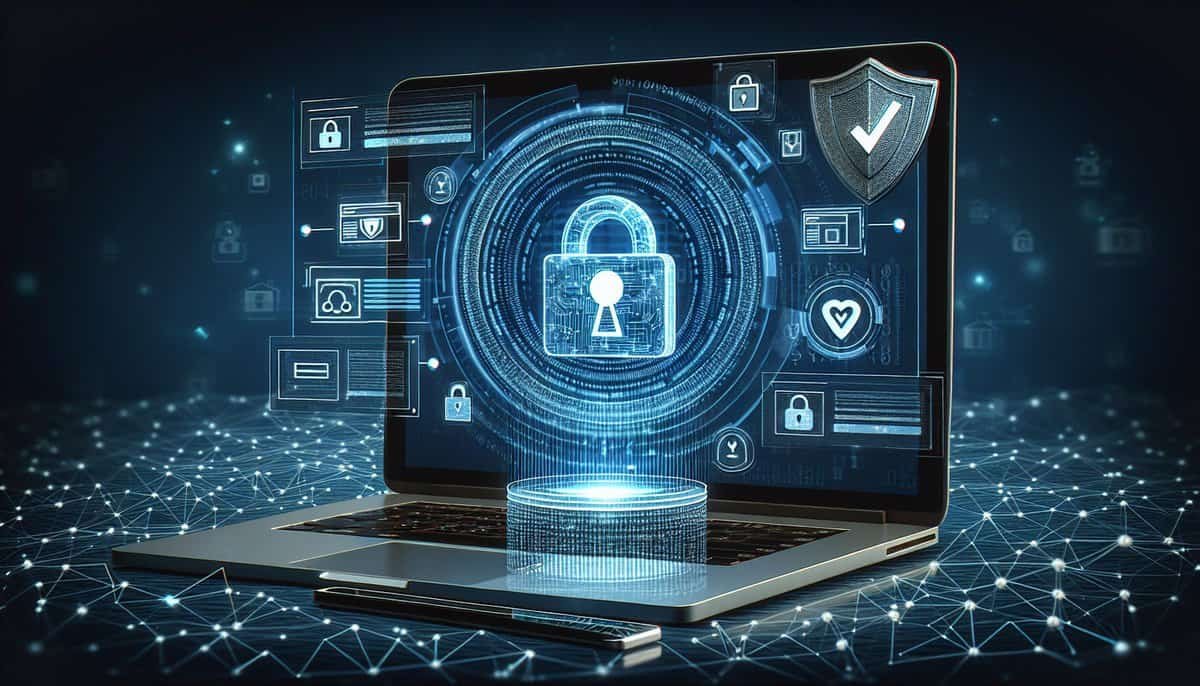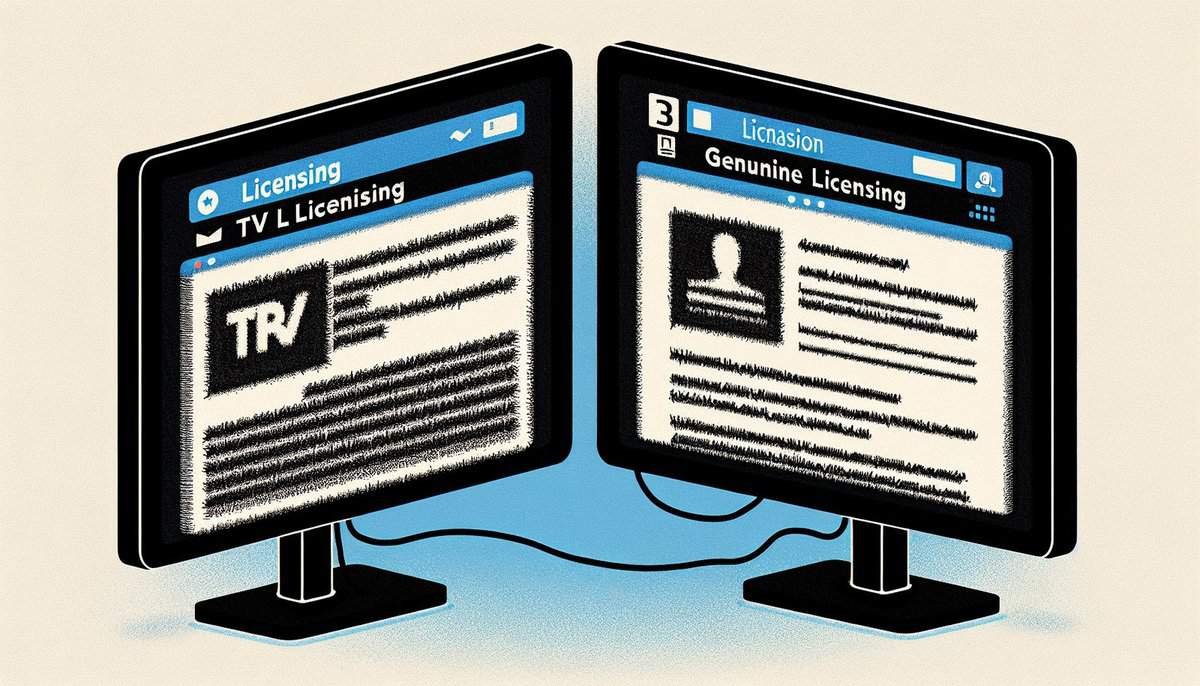TV Licence Scam Email: Stay Alert – Your Guide to Avoid Being Scammed

We may earn a small fee from the companies mentioned in this post.
Beware of TV licence scam email: fraudulent messages posing as TV Licence communications are tricking people everywhere. This guide reveals how to quickly spot these scams and protect your personal and financial details without falling for a scammer’s tricks related to the TV licence scam email.
Key Takeaways
TV licence scam emails aim to deceive recipients into providing personal and financial information by creating a false sense of urgency or claiming issues with their TV Licence. Recognising these scams is crucial to safeguard your details and avoid financial loss.
Common Red Flags:
- Sender’s Email Address: Genuine TV Licensing emails come from addresses like dontreply@tvlicencing.co.uk Scam emails may use similar but subtly different addresses to trick you
- Urgency and Threats: Scammers often claim your TV Licence is expiring or that you owe money, pressuring you to act quickly
- Requests for Personal Information: Legitimate TV Licensing communications will never ask for sensitive details like bank account numbers via email
- Spelling and Grammatical Errors: Fraudulent emails may contain noticeable spelling and grammar mistakes, a sign of a scam
- Unusual Payment Methods: Be wary of requests to pay with gift cards, wire transfers, or other unconventional methods
Tips to Avoid Falling Victim:
- Verify Email Addresses: Always check the sender’s email address. If in doubt, contact TV Licensing directly through their official website or customer service
- Do Not Click on Suspicious Links: Avoid clicking on any links or attachments in unsolicited emails. Instead, visit the TV Licensing website directly by typing the URL into your browser
- Use Secure Payment Methods: When making payments, ensure you are on the official TV Licensing website and that the connection is secure (look for “https” in the URL)
- Report Scam Emails: Forward any suspicious emails to the National Cyber Security Centre at report@phishing.gov.uk and to TV Licensing for investigation
- Stay Informed: Regularly update yourself on the latest scam tactics and how to protect against them. Awareness is your best defence
Recognising the Red Flags in TV Licence Scam Emails
As TV Licence holders, we are all potential targets of scam emails. These scammers are crafty, their tactics ever-evolving. However, they often leave clues that we can spot if we know what to look for.
While it may seem daunting to navigate the murky waters of scam emails, recognising the red flags can effectively help us thwart these fraudulent attempts.
The Sender’s Email Address
A key giveaway is the sender’s email and full web address used. Genuine TV Licensing emails come from specific addresses like donotreply@tvlicensing.co.uk. Scammers often create email addresses that are subtly different from the official ones, hoping to slip past our initial scrutiny.
We can outsmart these scammers by scrutinising the entire email address, not solely relying on the displayed name.
Content That Raises Suspicion
Scammers often use manipulative tactics to lure us into their trap. They may:
Promise refunds for overpayments
Alert us to false licence expirations
Create a sense of urgency, claiming there has been an issue with our most recent payment
Genuine TV Licensing emails, however, will never employ such pressure tactics.
Style and Grammar Giveaways
Scammers often give themselves away through their writing. Emails with generic salutations such as ‘Dear Customer’ or ‘Dear Client’ instead of our names are a red flag. . Grammatical errors and mistakes, such as odd spellings or incorrect terms, are another telltale sign.
Official TV licensing communications will always use correct grammar and spelling, and will include personal details and legitimate licence numbers.
Protecting Your Personal and Financial Details

Shielding our personal and financial details from these scammers is of utmost importance. They may attempt to deceive us with a fake website that mimics the official TV Licensing website, or with email addresses with subtle spelling differences.
For safety, it is advised to refrain from sharing bank details and only use the official TV Licensing websites for transactions.
Constant vigilance is necessary when it comes to sharing sensitive information. TV Licensing will never request such information unless we’re signed into our account on their official website. Scam emails, on the other hand, often falsely inform us about refunds or invalid records, in an attempt to extract our bank details.
Secure Payment Practices
Maintaining secure payment practices involves making payments to TV Licensing via their official website, via post, or by phone. You should avoid links in unsolicited emails.
Some emails and text message concerning mobile payments can be legitimate, but we should always verify the links provided.
Direct Debit and Payment Plan Safety
Maintaining the safety of your direct debit and payment plans is equally important. Genuine TV Licensing communications only send payment notices after a payment has been missed. They will not instruct you to ensure there’s enough money in the account or advise making a payment online – these are tactics often used in fraudulent emails.
Recognising Genuine Payment Updates
Genuine TV Licensing emails will contain your licence number, which you can verify against previous official correspondence or by checking your account on the official TV Licensing website.
The Simple Payment Plan customer portal offers features to view and manage your TV Licence and payment plan, serving as a reliable tool to confirm the legitimacy of payment-related communications, including verifying your payment details.
What To Do If You Suspect Fraud
The first step is not to panic. Instead, you should manually navigate to the official TV Licensing website to verify the status of your account and any outstanding payments. If you have interacted with a suspicious link, you should notify your bank immediately.
How to Verify Authentic TV Licensing Communications

Safeguarding yourselves from scams can be achieved by:
Verifying the authenticity of TV Licensing communications
Checking that genuine communications come from specific email addresses and include personal details like your name and part of your postcode
Verifying the legitimacy of TV Licensing websites by checking the web address
Contacted by TV Licensing? Verify First
Upon being contacted by the TV Licensing Organisation, it’s a good practice to verify the communication’s authenticity prior to providing any information. One way to ensure this is by checking the official TV Licensing logo is displayed and if the communication includes your licence number.
Checking for Official Logos and Branding
Checking for official logos and branding in emails can help you determine if the communication is genuine. The official TV Licensing logo is typically displayed at the top of an email address, their offical website and on official communications. You should also look for the correct postcode details.
Despite scammers using official logos in phishing emails, these can still be identified as fake emails through unexpected official requests or variations in the sender’s email address.
Reporting Procedures for TV Licence Scams
Aiding the authorities and helping protect others necessitates the reporting of any TV Licence scams. You can forward scam emails to the National Cyber Security Centre at report@phishing.gov.uk.
If you suspect you have experienced a financial loss due to a scam, you should contact Action Fraud immediately for investigation.
Forwarding Phishing Emails
Assisting the UK government in staying updated on scammers’ methods and tactics can be done by forwarding suspicious emails to report@phishing.gov.uk. This can help protect others from falling prey to these scams.
When to Notify Your Bank
In case of unwittingly sharing financial details with a suspected scammer, immediately contact your bank for assistance. Quick action is crucial upon realising that your personal details may have been shared with scammers.
Summary
TV Licence scams are a growing concern, but armed with knowledge, you can protect yourselves effectively. By recognising red flags, safeguarding your personal and financial details, maintaining the safety of your direct debit and payment plans, verifying the authenticity of TV Licensing communications, and knowing how to report scams, you are well equipped to thwart these fraudulent attempts. Let’s remain vigilant and safeguard your peace of mind.
Frequently Asked Questions
Do TV Licence inspectors actually visit?
Yes, TV Licence inspectors do actually visit homes, and they are required to immediately identify themselves and state the purpose of their visit. If you allow them to enter, the visit is usually quick and involves a brief inspection of the main living areas.
Will my TV Licence automatically renew?
If you pay for any part of your TV Licence through direct debit or payment card, it will automatically renew each year so you won’t need to do anything. If you prefer, you can also renew online through the TV Licensing website.
Do TV Licensing send out reminders?
Yes, TV Licensing does send out reminders, including reminders that your license is about to expire. If you prefer to receive these reminders by post rather than email, you can make the request accordingly.
What to do with suspicious emails?
Report suspicious emails to the National Cyber Security Centre (NCSC) to investigate and remove scam email addresses and websites, ultimately reducing the amount of scam emails received. It’s free and only takes a minute.
How can I verify the sender’s email address in a TV Licensing email?
To verify the sender’s email address in a TV Licensing email, always check the full email address, not just the displayed name. Genuine TV Licensing emails come from addresses like donotreply@tvlicensing.co.uk.
How to spot tv licence phishing emails?
Here are some tips to spot TV licence email scams:
Check the sender’s email address carefully. Official TV licence emails typically come from an address ending in @tvlicensing.co.uk. Be cautious of any variations or misspellings.
Look for grammatical and spelling errors in the email. Legitimate emails are usually well-written and professional. Phishing emails often contain poor grammar and spelling mistakes.
Always verify the authenticity of a TV Licence email by contacting the official TV Licensing customer service directly through their official website or phone number. If in doubt, do not respond to the email and report it as phishing.
How to report a tv licence scam?
You can report a TV licence scam to Action Fraud, the UK’s national fraud and cybercrime reporting centre.
Useful External Reference Links
- Action Fraud – The UK’s national reporting centre for fraud and cybercrime. Users can report scams and get advice about fraud, including TV Licence scams.
- Website: actionfraud.police.uk
- TV Licensing – The official site for TV Licences in the UK. It offers guidance on recognising and reporting scam emails purporting to be from them.
- Website: tvlicensing.co.uk
- Citizens Advice – Provides free, confidential information and advice to assist people with legal, debt, consumer, housing, and other problems, including advice on how to deal with scam emails.
- Website: citizensadvice.org.uk
- Financial Conduct Authority (FCA) – Offers information on how to protect yourself from scams and what to do if you’ve been scammed. The FCA also maintains a list of warnings about unauthorised firms.
- Website: fca.org.uk
- Ofcom – The UK’s communications regulator, which provides information on how to protect yourself from nuisance calls and messages, including scam emails.
- Website: ofcom.org.uk
- National Cyber Security Centre (NCSC) – Offers guidance on how to stay secure online, including tips on avoiding and reporting phishing attempts.
- Website: ncsc.gov.uk
With over three decades of experience in the heart of London’s financial sector, I have dedicated my career to the pursuit of robust cybersecurity practices and IT leadership. As a Certified Information Systems Security Professional (CISSP), Certified Information Security Manager (CISM), Certified Chief Information Security Officer (C|CISO), Certified Ethical Hacker (CEH), and Computer Hacking Forensic Investigator (CHFI), I bring a wealth of knowledge and expertise to the table.
My journey in the field of cybersecurity has not only been about personal growth but also about sharing my insights with others. As an international speaker, I have had the privilege of addressing audiences worldwide, discussing the importance of cybersecurity in today’s digital age. My passion for knowledge sharing extends to my work as an author and blogger, where I delve into the complexities of cybersecurity, offering practical advice and thought leadership.
In my role as a CISO and Head of IT, I have overseen the development and implementation of comprehensive information security and IT strategies. My focus has always been on creating resilient systems capable of withstanding the evolving landscape of cyber threats.
My Master’s degree in Cybersecurity has provided a solid academic foundation, which, when combined with my practical experience, allows me to approach cybersecurity from a holistic perspective.
I am always open to connecting with other professionals in the field, sharing knowledge, and exploring new opportunities. Let’s secure the digital world together.

